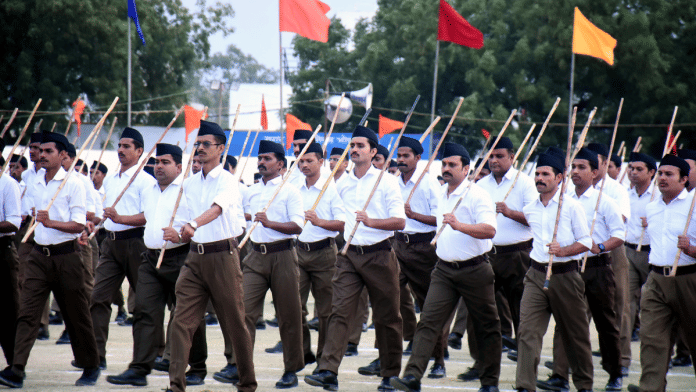Bhopal: For the past 10 months, the Centre seemingly delayed its response to a petitioner regarding its stand on whether government employees were allowed to participate in Rashtriya Swayamsevak Sangh (RSS) activities before removing the Sangh from the list of political organisations this month.
In September last year, Purshottam Gupta, a retired central government employee, had moved the Indore bench of the Madhya Pradesh High Court against the central government’s 1966 order barring its employees from taking part in the Sangh activities.
The central government failed to submit a reply on five occasions in the matter, the Indore bench of the high court said in its order in May.
In his petition, Gupta said that he intended to be integrally involved in the social, cultural and religious activities undertaken by the RSS and to join the organisation as an active member in the remaining years of his life.
The petitioner also urged the court to quash the office memorandum as per which all new government recruits had to give a declaration that they do not have a membership of either the RSS or the Jamaat-e-Islami.
In May, the bench of Justices S.A. Dharmadhikari and Gajendra Singh pulled up the central government for failing to file the replies despite having been given ample opportunities.
“On the last two occasions, by way of last indulgence time was granted to the respondent No.1 (Union of India) to file reply, failing which the opportunity to do the same shall stand closed. Today, when the matter was listed for hearing, counsel for the Union of India conveniently conveyed that the reply would take further four weeks’ time to be filed,” the court observed, after the standing council representing the central government once again sought time to file responses.
“Ideally, after giving last indulgence twice, the Court would have proceeded to consider the interim relief prayed for by the petitioner, being uninfluenced by the convenience exhibited by the counsel for Union of India in choosing not to file any reply. However, looking at the reliefs claimed in the writ petition, we tremendously felt that the writ petition cannot be adjudicated without an informed properly worded counter affidavit/reply filed by respondent No.1,” it observed.
The court also pointed out that it was inclined to pass order on the interim relief as requested by the petitioner, but refused to consider it given that the matter involved memorandums issued by the Ministry of Home Affairs (MHA) and/or the Department of Personnel and Training (DoPT).
“The constitutional validity of these rules (regarding the memorandums) have been put to assail on behalf of the petitioner which was issued way back in the 1960s and 1970s, almost half a century now,” the two-judge bench said.
On 6 May, the high court ordered the MHA and the DoPT to file response to the broad question raised by the petitioner. The secretaries/additional secretaries shall be present virtually on 22 May to explain inability in filing an affidavit in case they fail to do so, it ordered.
“If it is found that no sufficient justification for non-filing of the reply/counter affidavit is forthcoming, then the Court may be constrained to pass an order directing the physical presence of the concerned officers personally on a date fixed by the Court,” it observed.
But then on 22 May, the sixth time, Solicitor General Tushar Mehta, who appeared through video conference, requested another extension in the deadline to file responses. Mehta also explained that the delay has been on account of the general elections.
The Centre then made the submission of the notification lifting the ban on government employees in the Indore High Court a day before the hearing on the matter was scheduled 11 July, an advocate associated with the case informed The Print.
The next day the court heard the matter, and reserved its order.
When ThePrint contacted advocate Deputy Solicitor General Himanshu Joshi, he refused to comment stating that the matter was with the court. “As the matter is sub judice, I do not want to comment on the matter,” he said.
“We are awaiting the High Court order on the matter which is expected any day now,” Manish Nair, council for the petitioner, told ThePrint.
Garg, who retired from the Warehousing Corporation two years ago, told ThePrint that even his father has been associated with the Sangh. “I have closely seen the work done by the organisation and how selflessly they are committed to work for the country. After retirement, there is very little one can do, and I wanted to spent my remaining years serving our country through RSS, but this order was hindrance,” he said.
Garg then reasoned when Madhya Pradesh along with some other states have no such restrictions on their employees, then why should there have been such rules for central employees. “Ek desh mein do kanoon kaise ho sakte hai? (How can there be two laws regarding same subject?) And with this idea that there might be many like myself who might be suffering, I moved the high court.”
In 2006, the Madhya Pradesh government had removed the restrictions, as mentioned in the MP Civil Services (Conduct) Rules, on its employees from having links with the Sangh.
(Edited by Tony Rai)
Also Read: Hindu groups in Dhar determined to ‘reclaim Bhojshala’ after ASI report—‘It’s a matter of pride’






